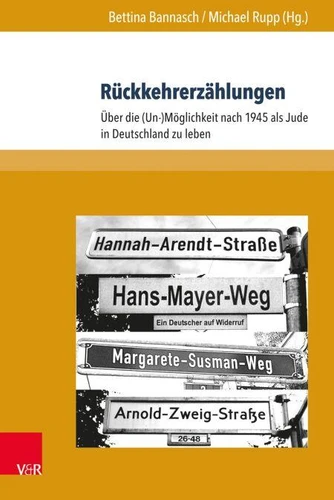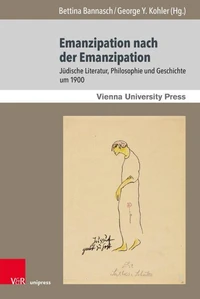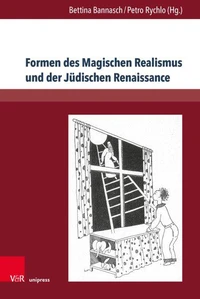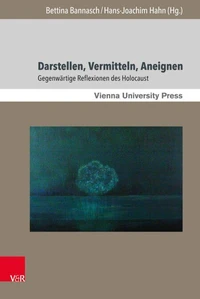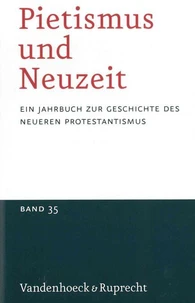Rückkehrerzählungen. Über die (Un - )Möglichkeit nach 1945 als Jude in Deutschland zu leben
Par : , , , ,Formats :
Disponible dans votre compte client Decitre ou Furet du Nord dès validation de votre commande. Le format PDF est :
- Compatible avec une lecture sur My Vivlio (smartphone, tablette, ordinateur)
- Compatible avec une lecture sur liseuses Vivlio
- Pour les liseuses autres que Vivlio, vous devez utiliser le logiciel Adobe Digital Edition. Non compatible avec la lecture sur les liseuses Kindle, Remarkable et Sony
 , qui est-ce ?
, qui est-ce ?Notre partenaire de plateforme de lecture numérique où vous retrouverez l'ensemble de vos ebooks gratuitement
Pour en savoir plus sur nos ebooks, consultez notre aide en ligne ici
- Nombre de pages238
- FormatPDF
- ISBN978-3-8470-0799-9
- EAN9783847007999
- Date de parution11/12/2017
- Protection num.pas de protection
- Taille3 Mo
- Infos supplémentairespdf
- ÉditeurV&R Unipress
Résumé
Ausgehend von exemplarischen Werken (deutsch-)jüdischer Autorinnen und Autoren nach 1945 loten die BeiträgerInnen den vielstimmigen Resonanzraum aus, in dem unterschiedliche Formen der Rückkehr nach Deutschland oder Österreich beschrieben werden. Dabei münden in den meist stark autobiografisch geprägten Texten nicht selten die Hoffnungen, die in einen Neuanfang gesetzt werden, in die schmerzliche Einsicht, dass das Land unwiderruflich mit seiner Geschichte verbunden und dass eine Rückkehr in die 'verlorene Zeit' vor der Shoah nicht möglich ist.
Analysiert werden Texte von Jean Améry, Hannah Arendt, Sammy Gronemann, Hans Mayer, Amos Oz, Doron Rabinovici, Margarete Susman, Arnold Zweig u. a. Der Band ist das Ergebnis einer zweijährigen interdisziplinären Zusammenarbeit deutscher und israelischer NachwuchswissenschaftlerInnen. Based on exemplary post-1945 works of (German-)Jewish authors, the contributions to this volume sound out the polyphonic 'resonance chamber', in which diverse forms of remigration to Germany or Austria are delineated.
Quite often within these texts - most of which are autobiographically influenced - the high hopes for a new beginning culminate into the painful realisation that there is just no way back to the 'lost time' before the Shoah. The case studies analyze, inter alia, works of Jean Améry, Hannah Arendt, Sammy Gronemann, Hans Mayer, Amoz Oz, Doron Rabinovici, Margarete Susman and Arnold Zweig. The present volume is the result of two years of interdisciplinary cooperation by young scholars from Israel and Germany.
Analysiert werden Texte von Jean Améry, Hannah Arendt, Sammy Gronemann, Hans Mayer, Amos Oz, Doron Rabinovici, Margarete Susman, Arnold Zweig u. a. Der Band ist das Ergebnis einer zweijährigen interdisziplinären Zusammenarbeit deutscher und israelischer NachwuchswissenschaftlerInnen. Based on exemplary post-1945 works of (German-)Jewish authors, the contributions to this volume sound out the polyphonic 'resonance chamber', in which diverse forms of remigration to Germany or Austria are delineated.
Quite often within these texts - most of which are autobiographically influenced - the high hopes for a new beginning culminate into the painful realisation that there is just no way back to the 'lost time' before the Shoah. The case studies analyze, inter alia, works of Jean Améry, Hannah Arendt, Sammy Gronemann, Hans Mayer, Amoz Oz, Doron Rabinovici, Margarete Susman and Arnold Zweig. The present volume is the result of two years of interdisciplinary cooperation by young scholars from Israel and Germany.
Ausgehend von exemplarischen Werken (deutsch-)jüdischer Autorinnen und Autoren nach 1945 loten die BeiträgerInnen den vielstimmigen Resonanzraum aus, in dem unterschiedliche Formen der Rückkehr nach Deutschland oder Österreich beschrieben werden. Dabei münden in den meist stark autobiografisch geprägten Texten nicht selten die Hoffnungen, die in einen Neuanfang gesetzt werden, in die schmerzliche Einsicht, dass das Land unwiderruflich mit seiner Geschichte verbunden und dass eine Rückkehr in die 'verlorene Zeit' vor der Shoah nicht möglich ist.
Analysiert werden Texte von Jean Améry, Hannah Arendt, Sammy Gronemann, Hans Mayer, Amos Oz, Doron Rabinovici, Margarete Susman, Arnold Zweig u. a. Der Band ist das Ergebnis einer zweijährigen interdisziplinären Zusammenarbeit deutscher und israelischer NachwuchswissenschaftlerInnen. Based on exemplary post-1945 works of (German-)Jewish authors, the contributions to this volume sound out the polyphonic 'resonance chamber', in which diverse forms of remigration to Germany or Austria are delineated.
Quite often within these texts - most of which are autobiographically influenced - the high hopes for a new beginning culminate into the painful realisation that there is just no way back to the 'lost time' before the Shoah. The case studies analyze, inter alia, works of Jean Améry, Hannah Arendt, Sammy Gronemann, Hans Mayer, Amoz Oz, Doron Rabinovici, Margarete Susman and Arnold Zweig. The present volume is the result of two years of interdisciplinary cooperation by young scholars from Israel and Germany.
Analysiert werden Texte von Jean Améry, Hannah Arendt, Sammy Gronemann, Hans Mayer, Amos Oz, Doron Rabinovici, Margarete Susman, Arnold Zweig u. a. Der Band ist das Ergebnis einer zweijährigen interdisziplinären Zusammenarbeit deutscher und israelischer NachwuchswissenschaftlerInnen. Based on exemplary post-1945 works of (German-)Jewish authors, the contributions to this volume sound out the polyphonic 'resonance chamber', in which diverse forms of remigration to Germany or Austria are delineated.
Quite often within these texts - most of which are autobiographically influenced - the high hopes for a new beginning culminate into the painful realisation that there is just no way back to the 'lost time' before the Shoah. The case studies analyze, inter alia, works of Jean Améry, Hannah Arendt, Sammy Gronemann, Hans Mayer, Amoz Oz, Doron Rabinovici, Margarete Susman and Arnold Zweig. The present volume is the result of two years of interdisciplinary cooperation by young scholars from Israel and Germany.

